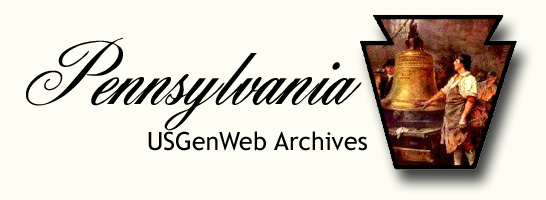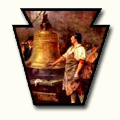|
A History of Pittsburg and Western Pennsylvania Troops in the War
By John V. Hanlon (Copyright 1919 by The Pittsburg Press)
Chapter VI
(The Pittsburg Press, Sunday, Feb. 9, 1919, pages 70-71)
Names in this chapter: Muir, Rickards, Miller, Shannon, Price, Martin, Kemp,
Meighan, Coulter, Bullitt
The rough and ready commander of the Twenty-eighth
division, Maj. Gen. C. A. Muir – “Uncle Charlie” the boys called him – and some
of the principal officers who led the Pittsburg and Western Pennsylvania troops
to glory in the great drive against the Germans in the Soissons-Rheims Salient.
THE ADVANCE OF THE TWENTY-EIGHTH DIVISION NORTHWAS FROM
CHATEU-THEIRRY WAS MARKED BY SOME STREUOUS FIGHTING, FOR THE GERMANS MADE A
STRONG EFFORT TO HOLD BACK THE AMERICANS IN ORDER TO GET THEIR ARMY AND WAR
MATERIAL OUT OF THE SOISSONS-RHEIMS POCKET. THE TAKING OF RONCHERES, WHICH FELL
TO THE LOT OF THE ONE HUNDRED AND TENTH REGIMENT, WAS A PARTICULARLY HARD TAKS
AND ITS CAPTURE LATER OF THE BOIS DE GRIMPETTE HAS BEEN CHARACTERIZED AS ONE OF
THE BITTEREST AND BLOODIEST BATTLES OF THE WAR.

Maj. Gen. C. A. Muir
The taking of Roncheres fell to the lot of the One
Hundred and Tenth Regiment. This town like all the others was strongly held by
the Germans who had massed machine guns and fresh infantry for the sole purpose
of making its capture as costly as possible for the Americans. Like every other
village in this section the Boche had no intention of retaining it, but was
concerned mostly in holding back our boys as long as possible in order to
successfully get his armies and material out of the Soissons-Rheims salient.
With their characteristic disregard for every finer
instinct, the Germans had made the church the center of their resistance. This
church stood in such position as to front on an open square in the center of
town, and the enemy was thus able to command the roads which entered this square
from different directions.
Every building, every wall, tree or fence corner sheltered a sniper or machine
gun and most of the enemy, at this point, kept up such a determined resistance
that they died where they stood. In some instances, when an American was close
enough to point the cold steel of his bayonet at a Boche up would go his hands
with a cry of “kamerad.” There was always something the threat of the bayonet
which the Hun could never withstand. However, it may as well be set down here as
in the future that the men of the One Hundred and Tenth took few prisoners, for
they did not trust the cry of “kamerad!” They usually disposed of the foe with
scant ceremony.

Col. George C. Rickards
GERMAN WARFARE
On previous occasions they had learned that the Hun was
never to be trusted. They had lost comrades as the result of this treachery
because a Boche might still have his hands in the air, pleading for mercy and at
the same time have his foot on the lever of a machine gun. His hands in the air
were frequently but a decoy to lure our men within close range of the deadly
weapon which he could set going with this foot.
So in Roncheres our men of the One Hundred and Tenth
played the old game of hide and seek and they were always “it.” To be tagged
meant death for the Hun. They moved steadily from building to building until
they came in range of the village church. Then their progress was stayed for a
time.
On the roof of the church was a cross made from some
kind of red stone. Behind it the Germans had planted guns. Three guns were
hidden in the belfry from which the Huns had removed the bells and shipped them
into Germany, and stationed in every nook and cranny of the magnificent gothic
walls and balconies were snipers, machine gunners or artillerymen with small
cannon.
After much careful work sharpshooters of the One
Hundred and Tenth finally picked off the Germans behind the cross, but the
little fortress in the belfry still held out and was capable of doing
considerable execution. Detachments set out to work their way around the outer
edge of the town and thus surround the church. Our Pennsylvanians would dodge in
and out from street corner to street corner and from building to building ever
seeking to escape the quick eye of the enemy snipers. When they found a house
with sufficiently strong walls to withstand the foe bullets, sharpshooters would
be stationed there to keep the Hun fire down until some of the men could rush
into the next house. It was fight every step of the way.
YANKEE STRATEGY WINS

When the Pennsylvanians came to the roads which
radiated from the square to the four corners of the village they had to pause
and work out a new plan of attack, for it was necessary to cross these roads in
order to advance further and to attempt the feat would have been nothing less
than suicidal in view of the hurricane of bullets with which they were
continually swept.
When sufficient detachments of our men had reached the
various corners to provide enough strength for a sortie a barrage of rifle
bullets was put on the Germans. Sharpshooters were stationed at every possible
point where they could watch the Boche, and they commenced to pump lead into
every place where they believed the German bullets were coming from. They did
not give the foe a chance to show himself, but kept showering him with bullets.
In this way the Hun fire was reduced to a minimum and the rush across the
streets was made. Gaining the other side the Pennsylvanians worked closer to the
church along another row of houses, cleaning up the enemy as they progressed. It
was slow and dangerous work but our boys never flinched.
During all this fighting the church remained the
dominating figure, as it had been of the village landscape so many years. Its
stout stone walls, gray with age and built to last for centuries, offered the
ideal shelter for the vandals who were desecrating its sacred precincts. Before
our men could do anything more it was imperative that the enemy therein must be
cleaned out.
In previous fighting in this territory a German shell
had opened a convenient hole in the masonry at the rear of the church and groups
of the Pennsylvanians worked their way as close to this spot as possible without
exposing themselves to the Boche in the church. Then they put down another rifle
barrage using the same tactics whereby they were able to get across the fire
swept streets. A detachment of the One Hundred and Tenth rushed for this hole in
the wall and rapidly filtered through into the interior which shortly became a
charnel house for the Hun. They soon cleaned the foe out and then tackled the
belfry where the little group of Boche still persisted in the defense.

TOOK CHURCH, BUT NO PRISONERS.
One man led the way up the winding stone stairway,
fighting every step of the way, and strange to relate he was able to reach the
top despite the fact that many below him were caught in the rain of missiles.
Hurled down by the frantic Huns who thus sought to stay this implacable advance.
When a few of our men had gained the top of the stairs
one German junior officer, presumably in command of the group, leaped from the
belfry to his death on the stones in the courtyard below. Then the three
remaining Huns set up a loud plea for mercy, wildly waved their arms in the air,
and yelled “kamerad!” Whether or not their pleas were granted will probably
never be definitely ascertained as the Pennsylvanians who were there do not have
any clear perception as to just what happened. However, the idea seems to
prevail that no prisoners were taken in the church – at least some of the men
say they didn’t see any brought out.
After the capture of the church it was a comparatively
easy matter to mop up the rest of the town, but even then our boys had only a
brief breathing spell, for the regiment was soon on the march again, swinging
over towards Courmont which was reached just in time to help the boys of the One
Hundred and Ninth in wiping out the last machine gunners there.
At Courmont our Pennsylvanians had almost reached the
Ourcq river where the enemy had taken advantage of the natural defenses on the
other side of the stream to make a determined stand. In fact here had been
constructed a second line of defense. And here was fought one of the most
stubborn and bloodiest battles of the war.

THE CROSSING OF THE OURCQ
Our men faced the Guardsmen, Jaegers and Bavarians with
contingents of Saxon machine gunners – the whole making up the flower of the
troops under command of the crown prince. They had orders not to give away even
a foot of ground before the Americans. The enemy fought sullenly and with all
the traditional vigor of the famed units engaged, but they could not hold
against the irrisistable [sic] Pennsylvanians.

Col. George E. Kemp
The crossing of the Ourcq had been described as one of
the finest feats accomplished by the Americans in the way. The Ourcq itself was
negligible as an obstacle to the troops, for it is really on a little stream and
the Americans called it a “creek.” At this point it is only about 20 feet wide
and six inches deep. But what makes the Ourcq formidable is the heights beyond.
The river being old, it has worn itself a deep bed with high banks on each side.
Just north of Courmont and on the opposite side of the
Ourcq is the Bois de Grimpette, a small wooded tracks, and here was staged the
most ferocious fight of the entire line. This particular phase of the battle has
been described as “the One Hundred and Tenth’s own show.”

It was one of those feats which become regiments
traditions, the tales of which are handed down for generations within regimental
organizations and in later years become established as standards towards which
future members may aspire with only small likelihood of attaining.
COMPARED WITH BELLEAU
The operation, in the opinion of many high officers who
witnessed it, compared most favorably with the never-to-be-forgotten exploit of
the Marines in the Bois de Belleau.
There were these differences: First, the Belleau Wood
fight occurred at a time when all the rest of the Western Front was more or less
inactive, but the taking of Grimpettes Wood came in the midst of a general
forward movement that was electrifying the world, a movement in which miles of
other front bulked large in public attention; second the taking of Belleau was
one of the very first real battle operations of Americans, and the Marines were
watching by the critical eyes of a warring world to see how “those Americans”
would compare with the seasoned soldiery of Europe; third, the Belleau fight was
an outstanding operation, both by reason of the vital necessity of taking the
wood in order to clear the way for what was to follow and because it was not
directly connected with or part of other operations anywhere else.
“The Germans have a strong position in Grimpette
Woods,” the One Hundred and Tenth was told. “Take it.” The regiment by this time
had learned something of German “strong positions,” and so the men prepare to
tackle a stiff job. In the early days of their fighting they had gone about such
jobs with an utter disregard of the enemy machine guns, but they were not more
experienced and knew that such recklessness did them no good and was of no
service to America because of the useless sacrifices such tactics entailed.
Yet when they looked over the territory which they were
expected to rid of the Hun they were convinced that they had no alternative but
to do just that thing and face a well organized and strongly held enemy
position. Grimpette Woods was fairly bristling with every sort of Hun weapon and
gunners were chained to their weapons. The underbrush was laced through and
through with barbed wire, concealed strong points checker-boarded the dense,
second-growth woodland. When the Pennsylvanians took one next of machine guns
they found themselves fired on from two others. This mace of machine guns and
snipers was supplanted by countless mortars and one-pounder cannons.
INTO A HELL OF FIRE
The most difficult task in connection with the capture
of this wood, the taking of the hilly section, was assigned to the One Hundred
and Tenth, and the other regiment of the Fifty-fifth Infantry brigade, the One
Hundred and Ninth, was ordered to clean out the lower part.
It was a murderous undertaking, for the nearest “cover”
from the edge of the wood was at Courmont, more than 700 years away. The men
rushed out from the protection of the buildings in Courmont in the most perfect
and approved wave formations and were immediately met by a hurricane of bullets.
Some of the men later said that it seemed almost like a solid wall in places.
There was not even as much as a leaf to protect them. The rattle of the hundreds
of machine guns in the woods gradually increased in volume until they blended
into one solid roar, and the one-pounder cannon played havoc with our troops,
while German airmen, who had almost complete control of the air in that
vicinity, soared as low as 100 feet from the ground and poured a stream of
machine gun bullets into the ranks of those dauntless Pennsylvanians. The airmen
also raked the ranks with high explosive bombs. Our men were forced to organize
their own air defense and proceeded to use their rifles, but without much
deterrent effect on the Hun flyers.
How any man ever lived in that welter of fire is a
mystery, but a few won to the edge of the wood, and, flinging themselves down on
the ground, dug in. A few of the others who were nearer the wood than the town
did not attempt to retrace their steps in that awful rain of lead and steel, but
flung themselves into shell holes or an slight depression in the ground which
offered even temporary safety. The high officers recalled the attack, realizing
that the losses were beyond reason for the value of the objective. However,
neither officers or men of the One Hundred and Tenth were satisfied, and they
all pleaded for another chance. No matter what the cost this was Western
Pennsylvania’s day against the Hun and the task had not been performed in
accordance with all the traditions of that section of the great commonwealth.
Furthermore, there were living and wounded comrades out there in the Gehena of
fire who could not long be left unsupported.
THEN THEY FOUGHT AGAIN
The higher officers were impressed by this plea, and
after the men had secured a breathing spell they were allowed to have another
try. Then forming again they set their teeth and plunged into that storm of lead
and steel. They didn’t even have adequate artillery support, for the guns were
busy elsewhere and many batteries were still struggling over the ruined roads in
an effort to get near the front.
One the second attack another handful of men managed to
filter through to the edge of the wood, but the main attacking force was driven
back. It seemed almost as if noting could withstand that withering enemy blast
of fire. For three more times our boys, undaunted, attempted to cross that
bullet-swept stretch of ground, and each time they were forced back to the
shelter of Courmont.
After this fifth attack headquarters had received
information, July 30, 1918, that the artillery had come up and would put a
barrage on the wood. Maj. Martin, in command of the One Hundred and Tenth, when
he heard this said: “Fine: we will clean the place up at 2:30 o’clock this
afternoon.” And this is just what the regiment did.
The artillery put down a terrific barrage on the wood
and the Huns were driven to shelter, while holes were opened in the near side of
the wood and the wire was cut in many places. The few Pennsylvanians who had won
their way to the edge of the wood in the previous attacks had to dig in deeper
and find whatever shelter they could, for they were forced to withstand the
rigors of their own barrage. It was a terrible experience to have to undergo the
bombardment of their own guns.
SIXTH ATTACK SUCCESSFUL
Then came the order to advance in the sixth assault on
Grimpette Woods, and as the men rushed forward the barrage lifted. The big guns
had given just the added weight to carry them across the open space, and they
were well on their way when the Germans were able to come out of the dugouts and
take position at their guns. The first wave of Americans, angry and yelling like
Indians, was on them before they could do much damage.
That was the beginning of the end for the Germans in
the Bois de Grimpette, for our boys went through it in a hurry with man against
man, using the bayonet unsparingly and unmercifully. Some prisoners were sent
back, but this was the exception rather that the rule, and the burial squads
laid away more than 400 German bodies in the Grimpette. The American loss in
cleaning up the wood was hardly a tithe of that. It was truly a dashing and
heroic bit of work, typical of the gallantry and spirit of our men.
After the first attack on the wood had failed First
Sergt. William G. Meighan, of Waynesburg, Co K, One Hundred and Tenth regiment,
in the lead of his company, was left behind when the recall was sounded. He had
flung himself into a shell hole in the bottom of which water had collected. The
machine gun fire of the Germans was low enough to “cut the daisies,” as the men
remarked. Therefore, there was no possibility of crawling back to the lines. The
water in the hold in which he had sought shelter attracted all the gas in the
vicinity, for Fritz was mixing gas shells with his shrapnel and high explosives.
The German machine gunners had seen the few Americans
who remained on the field, hiding in shell holes, and they kept their guns
spraying over those refuges. Other men had to don their gas masks when the gas
shells came over, but none seem to have undergone the experience Sergt. Meighan
did.
THE DREADED GAS MASK
It is impossible to talk intelligently or to smoke
inside a gas mask. A stiff clamp is fixed over the nose and every breath must be
taken through the mouth. Soldiers adjust their masks only when certain that gas
is about. They dreaded gas more than anything else the German had to offer, more
than any other single thing in the dread category of horrors with which the
Kaiser distinguished this war from all other wars in the world’s history. Yet
the discomfort of the gas mask, improved as the present model is over the device
that first intervened between England’s doughty men and a terrible death, is
such that it is donned only in dire necessity. Soldiers hate the gas mask
intolerably, but they hat gas even more.
For 15 hours he was forced to crouch in the water in
this shallow hole with his gas mask on, but despite the terrible ordeal he still
had plenty of fight left in him. When in a later attack on the wood Co. K
reached the point where Sergt. Meighan was concealed he discovered that the last
officer of the first wave had fallen before his shelter was reached. Being next
in rank he promptly signaled to the men that he would assume command, and led
them in a gallant assault on the enemy position.

FOUGHT TO HIS DEATH
There were also many other men of the One Hundred and
Tenth who displayed marked gallantry and that spirit of sacrifice which made our
boys so successful in the various enterprises in which they engaged. Lieut.
Richard Bullitt, of Torresdale, an officer of Co. K, was struck in the thigh by
a machine bullet in one of the first attacks, and although unable to walk he
crawled 100 yards to where there was a squad with an automatic rifle out of
commission and which the men could not operate. The corporal in charge of the
rifle squad seems to have been the only one of the men who could operate it. He
had been killed and Lieut. Bullitt quickly had the gun throwing death into the
German ranks. While he was operating the automatic five more bullets struck him
but he kept on. He waved the stretcher bearers away who wanted to take him to
the rear, but finally another bullet struck him in the forehead and killed him.
After the wood was completely in our hands a little
column was observed moving across the open space towards Courmont. When it go
close enough it was seen to consist entirely of unarmed Germans. Staff officers
were just beginning to fuss and fume about the ridiculousness of sending a party
of prisoners back unguarded when they discovered a very dusty and a very
disheveled American officer bringing up the rear with a rifle held at the
“ready.” He was Lieut. Marshall S. Baron, Latrobe, of Co. M. There were 67
prisoners in his convoy and most of them he had taken personally.


|













